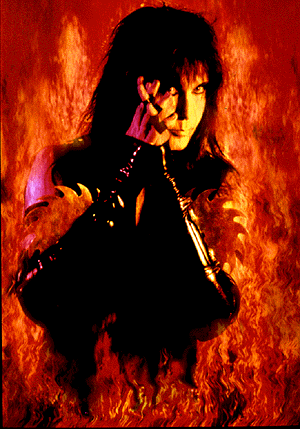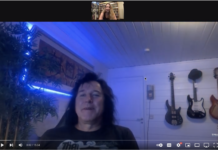W.A.S.P. has aimed to please, dedicating fourteen months to the creation of their thought-provoking album, Unholy Terror (Metal-Is). The April 2001 release features Blackie Lawless (vocals, guitar), along with Chris Holmes (lead guitar), Mike Duda (bass), and Stet Howland (drums), a line-up that has been maintained consistently for almost six years now.
According to Lawless, “That’s fourteen nonstop months.” He says, “This was a very intense record to make. It was quite draining.”
“We work really hard at little minute things that a lot of people might not notice, but if it wasn’t right they would notice it…a lot of times it seems like it can be an unrewarding process because of that, but ultimately at the end of the day, you’re not making records for other people, your making them for yourself.”
As the album confronts social, religious, and political hypocrisy, it reminds Lawless of a cross between two of the bands older albums, namely Headless Children and their first self-titled album. In fact, he compares the opening track “Let it Roar” to “I Wanna Be Somebody,” and says that the second track “Hate to Love Me” could have easily been on the band’s first album. Like any artist, he would like to think that his band’s latest effort is just as good as anything else they have ever done, and thus far reactions to the album have confirmed that assumption.
“You don’t premeditate these things before you do them, you just kind of start going for it, and usually about two-thirds of a way through a record, it starts reveal itself – what it’s going to be. And it was a refreshing combination when it was done I looked at it and thought, ‘wow, this feels a little like both of those’,” explained Lawless.
But the album isn’t exactly all that predictable…
“There’s a song called “Evermore” on the album, which is looking at the idea of the possibility that maybe we’ve lived before — past lives. And I’m not saying that I believe in it. I’d like to. Its something that I’m exploring, and I don’t know what I’m going to find if anything, but I’ve had some interesting experiences with it, and “Euphoria” kind of came out of that, because “Euphoria” was something that I had done when I cleared my head…you can channel creative energy.
I had gotten into the state where I had done that, and I wrote that song in one take. I’d never done that with any song before. Usually, songwriting is a building block process, where you put one on top of another, and you kind of just go from there. And like I said, I wrote it just in one take, and I looked at it when I was done and I was really astonished at the chord progression, because it was something, consciously, I would have never thought of.”
Lawless says that the song was a unique little thing, and while it has almost nothing to do with the album, it is “completely totally artistic self-indulgence.” He explained that grouping the song between two fairly intense songs added contrast.
“You can’t have black without white, that’s artistic contrast, a lot of artists might not do that. Like I said, from my point of view, it was artistic self-indulgence, but when I was done with it, I just loved that little piece to death. And it felt that like the title, it felt euphoric, it felt like a drug, and that’s when I came up with the idea, ‘hey this is music to get high by’, whatever that may be for the individual.”
Though he left room for his indulgence, the whole moral behind Unholy Terror is: think for yourself, seek out your own answers, come to your own conclusions, and don’t accept prepackaged beliefs or ideals from anybody else. However, it is in no way intended to be blasphemous. It is simply meant to show that it can be dangerous when people don’t necessarily want to or have to think for themselves and unquestionably accept the ideal of organized social, religious, and government organizations.
Furthermore, Lawless says that he always writes what he is feeling at the time, because “That’s the only way to make it real.”
He says, “I felt conviction to talk about some of the things on this record that I did…I’m doing what I feel convicted by at the moment…”
“I want to make it perfectly clear that I’m not hear to knock anybody’s religion. All I’m trying to say is think for yourself, don’t necessarily swallow everything that’s handed to you — seek out your own answers,” he emphasized.
Lawless says if you go back to albums like Headless Children or the Crimson Idle, and other things that W.A.S.P. has done through the present, you will find that there are common threads that run through those albums, and a lot of what they are saying is that there are kids standing there saying ‘hey, pay attention to me, show me some love, and maybe I won’t blow up on you’. And now, that same issue is raised again on a new track called “Loco Motive Man.”
“When you’ve got kids that are taking guns to school or making bombs in their basements, God knows we’ve seen too many examples of that in the last few years, that’s something that didn’t happen when I was going to school. Somebody got mad, you had a fist fight, and that was pretty much it. But now, they’re playing for keeps,” explained Lawless
He believes that the method behind this madness lies in a child’s upbringing, and recalls how he could have never put something over on his own mother, because she had eyes in the back of her head, always knowing exactly what he was doing, even before he did it.
He asks “How can somebody’s parents not know their kids are building weapons and mass destruction in their basement?”
“I just don’t get it. And it takes me back to the whole Judas Priest/Ozzy Osbourne thing when they got sued for writing lyrics that supposedly led somebody to commit suicide. I hate to sound cruel, but really, in all honesty what that is, is the parents continuing in death, the same thing that they did when the kid was alive.
They’re refusing to take responsibility for what they did — So in death they still don’t want to accept the idea that they didn’t give the kid what they needed when they were here. And I’m sorry, I know the kids are gone and I feel bad about that, but you can not turn around and point the accusing finger at somebody else for something you did not do,” he exclaimed.
After breaking away from the studio and these issues just a few weeks ago, W.A.S.P. is in the midst of determining their tour plans for the spring and summer, which are scheduled to kick-off on May 1. To keep his voice up to the task, Lawless says it is more about what he doesn’t do.
“I just do maintenance pretty good, and just try not to abuse it. And when I say abuse it, I’m talking about how there’s a limit sometimes to the amount of fun you can have, and I got the crap scared out of me a long time ago by abusing it. So, I’ve learned my lesson, because, hey, I’m never going to be remembered as a guitar player. My immortality lies in my throat, so I’ve got to take care of it.”






